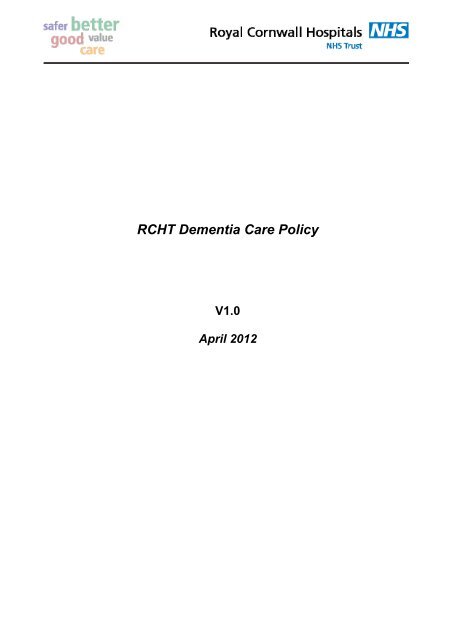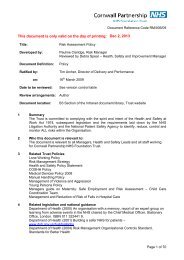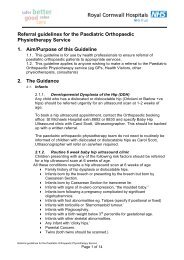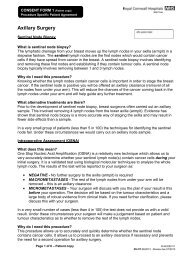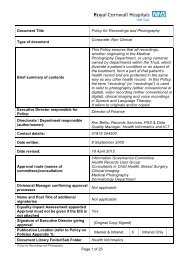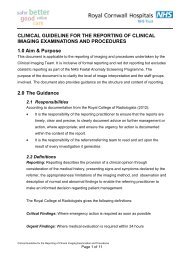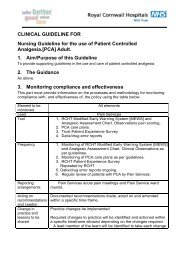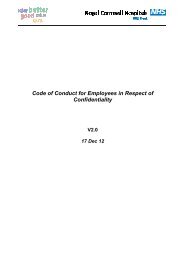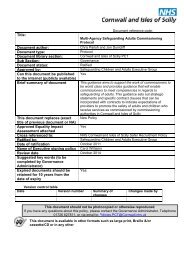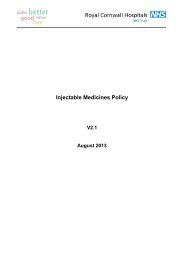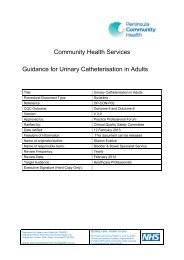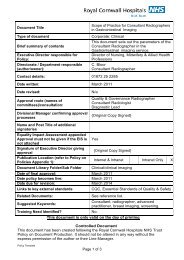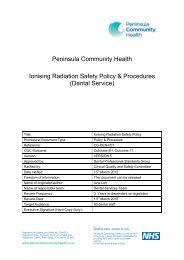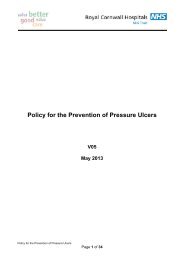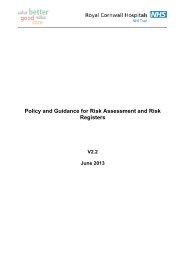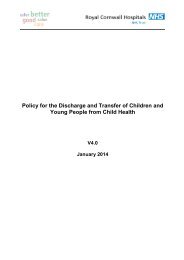RCHT Dementia Care Policy - the Royal Cornwall Hospitals Trust ...
RCHT Dementia Care Policy - the Royal Cornwall Hospitals Trust ...
RCHT Dementia Care Policy - the Royal Cornwall Hospitals Trust ...
Create successful ePaper yourself
Turn your PDF publications into a flip-book with our unique Google optimized e-Paper software.
<strong>RCHT</strong> <strong>Dementia</strong> <strong>Care</strong> <strong>Policy</strong><br />
V1.0<br />
April 2012
Table of Contents<br />
1. Introduction...................................................................................................................3<br />
2. Purpose of this <strong>Policy</strong> ...................................................................................................3<br />
3. Scope ...........................................................................................................................3<br />
4. Definitions / Glossary....................................................................................................3<br />
5. Ownership and Responsibilities....................................................................................3<br />
6. Standards and Practice ................................................................................................5<br />
7. Dissemination and Implementation...............................................................................7<br />
8. Monitoring compliance and effectiveness .....................................................................7<br />
9. Updating and Review....................................................................................................8<br />
10. Equality and Diversity................................................................................................8<br />
STRATEGIC POLICY CONTEXT ......................................................................................10<br />
Appendix 3. Governance Information ................................................................................18<br />
Appendix 4.Initial Equality Impact Assessment Screening Form .......................................20<br />
<strong>RCHT</strong> <strong>Dementia</strong> <strong>Policy</strong><br />
Page 2 of 21
1. Introduction<br />
1.1. <strong>Dementia</strong> and <strong>the</strong> challenges of mild cognitive impairment will touch <strong>the</strong> vast<br />
majority of our services directly or indirectly. Nationally <strong>the</strong> impact is recognised and<br />
anticipated to grow as <strong>the</strong> demographic changes across our society witness a<br />
significant growth in <strong>the</strong> older age population. The <strong>Trust</strong> Board has approved a local<br />
hospital-wide dementia strategy (Appendix 2, December 2010) which sets this<br />
context nationally and presents <strong>the</strong> local challenge to us all. This policy exists to<br />
translate that strategy into practical means to benefit <strong>the</strong> population with dementia<br />
and mild cognitive impairment using our services today and into <strong>the</strong> future.<br />
2. Purpose of this <strong>Policy</strong><br />
2.1. The purpose of this policy is to ensure <strong>the</strong> <strong>Trust</strong> meets strategic and clinical<br />
best practice standards in delivering its ambition to provide excellent dementia care<br />
services.<br />
3. Scope<br />
3.1. This policy applies to all <strong>Trust</strong> staff who are directly or indirectly involved in <strong>the</strong><br />
care of people with dementia or cognitive impairment, <strong>the</strong>ir carers and families.<br />
4. Definitions / Glossary<br />
4.1. <strong>Dementia</strong>: The term 'dementia' is used to describe <strong>the</strong> symptoms that occur<br />
when <strong>the</strong> brain is affected by specific diseases and conditions. These include<br />
Alzheimer's disease, vascular dementia, dementia with Lewy bodies and<br />
sometimes as a result of a stroke.<br />
4.2. Mild cognitive impairment (MCI): is a relatively recent term, used to describe<br />
people who have some problems with <strong>the</strong>ir memory but do not actually have<br />
dementia. It is a descriptive term ra<strong>the</strong>r than a specific medical condition or disease.<br />
It describes memory loss apparent to <strong>the</strong> individual, and those around <strong>the</strong>m.<br />
4.3. In <strong>the</strong> context of this polciy ‘<strong>Dementia</strong>’ from now on will include MCI, unless<br />
seperation is warrented. (Definitions taken from Alzheimer’s Society Fact Sheet 400<br />
and 470)<br />
5. Ownership and Responsibilities<br />
5.1. The Chief Executive and wider <strong>Trust</strong> Board have key roles and responsibilities to<br />
ensure <strong>the</strong> <strong>Trust</strong> meets requirements set out by statutory and regulatory authorities<br />
(for example: <strong>the</strong> Department of Health, Commissioners and <strong>the</strong> <strong>Care</strong> Quality<br />
Commission). These responsibilities are delegated to an Executive Lead with<br />
supportive structure to ensure and assure standards and expectations are met. These<br />
are described below.<br />
5.2. Role of <strong>the</strong> Executive Lead<br />
The Executive Director for Nursing, Midwifery and Allied Health Professional is <strong>the</strong><br />
nominated Executive Lead and will be responsible for ensuring structures and<br />
processes are in place to assure delivery of <strong>the</strong> <strong>Dementia</strong> Strategy. The Executive<br />
Lead will report to <strong>Trust</strong> Board on progress as required.<br />
5.3. Role of <strong>the</strong> <strong>RCHT</strong> <strong>Dementia</strong> Action Group Members<br />
The Action Group is made up of three distinct participative groups: subject specialist,<br />
divisional representatives and importantly service users, carers and representatives<br />
of people with dementia.<br />
<strong>RCHT</strong> <strong>Dementia</strong> <strong>Policy</strong><br />
Page 3 of 21
Subject specialist: bring expertise of <strong>the</strong> subject, from clinical, managerial and<br />
commissioning perspectives<br />
Divisional representative: are fundamental to ensure work flows from <strong>the</strong><br />
action group to clinical teams and that a feedback mechanism is established<br />
back to <strong>the</strong> action group<br />
Service users, carers and representatives of people with dementia: bring<br />
reality to <strong>the</strong> action group of <strong>the</strong> patient group <strong>the</strong> action group serves<br />
The Action Group is responsible for delivering <strong>the</strong> clinical and corporate<br />
requirements linked to <strong>the</strong> ‘<strong>Dementia</strong> Strategy’, <strong>the</strong> ownership of a local<br />
improvement plan, which is updated and monitored bi-monthly, is key assurance<br />
measure of progressive quality improvements for this patient group. This Group<br />
reports bi-monthly to <strong>the</strong> <strong>RCHT</strong> Governance Committee.<br />
5.4. Role of <strong>the</strong> <strong>RCHT</strong> Governance Committee<br />
The <strong>RCHT</strong> Governance Committee will hold to account <strong>the</strong> work and actions of <strong>the</strong><br />
<strong>RCHT</strong> <strong>Dementia</strong> <strong>Care</strong> Action Group. It will receive and scrutinise progress in<br />
delivering <strong>the</strong> local improvement plan on behalf of <strong>the</strong> <strong>Trust</strong> Board.<br />
5.5. Role of <strong>the</strong> <strong>RCHT</strong> <strong>Dementia</strong> Link Workers (DLWs)<br />
A <strong>RCHT</strong> <strong>Dementia</strong> Link Worker Networks exists to enable clinical champions in each<br />
clinical area to audit, monitor and progress practices changes with <strong>the</strong> aim to improve<br />
<strong>the</strong> care of people with dementia, <strong>the</strong>ir carers and families. DLWs are empowered to<br />
deliver <strong>the</strong> ambition of <strong>the</strong> organisation to provide excellent care for such people<br />
across its whole service. Their role responsibilities are set out in appendix 3, this role<br />
has <strong>Trust</strong> Board endorsement.<br />
5.6. Role of Divisional Management Teams<br />
Divisional Management Teams (Divisional Director, Divisional General Manager and<br />
Divisional Nurse) are responsible for ensuring <strong>the</strong>ir divisional representative and local<br />
network of DLWs are pulling toge<strong>the</strong>r driving up <strong>the</strong> standards of care. Effective<br />
mechanism for communication and disseminator of information to all clinical teams<br />
must be assured.<br />
5.7. Role of Ward and Department Sisters and Charge Nurses (and o<strong>the</strong>r<br />
Departmental Leads / Managers)<br />
Line managers are responsible for identifying and supporting <strong>the</strong>ir local DLW in<br />
driving through changes and to ensure effective communication channels exist to <strong>the</strong><br />
divisional representative encouraging dissemination of information and actions<br />
across <strong>the</strong> wider health care team.<br />
5.8. Role of Individual Staff<br />
All staff members are responsible to ensure <strong>the</strong>y comply with <strong>Trust</strong> policy regarding<br />
<strong>the</strong> care of people with dementia (including MCI (see Definitions)). They must meet<br />
requirements set out regarding learning and development for <strong>the</strong>ir level of<br />
involvement with people with dementia and should ensure <strong>the</strong>y know who <strong>the</strong>ir local<br />
dementia link worker or divisional representative is to enable communication and<br />
sharing of information.<br />
<strong>RCHT</strong> <strong>Dementia</strong> <strong>Policy</strong><br />
Page 4 of 21
6. Standards and Practice<br />
6.1. Hospital Standards of <strong>Dementia</strong> <strong>Care</strong><br />
8. Appropriate<br />
training and<br />
workforce<br />
development<br />
1. Respect,<br />
dignity and<br />
appropriate care<br />
2. Agreed<br />
assessment,<br />
admission and<br />
discharge<br />
processes with a<br />
needs specific<br />
care plan<br />
5. Nutrition and<br />
hydration needs<br />
are well met<br />
7. Ensure quality<br />
of care at <strong>the</strong> end<br />
of life<br />
3. Access to a<br />
specialist older<br />
people’s s mental<br />
health liaison<br />
service<br />
4. A dementia<br />
friendly hospital<br />
environment;<br />
minimising<br />
moves<br />
6. Promote <strong>the</strong><br />
contribution of<br />
volunteers<br />
Established at <strong>the</strong> end of 2010 <strong>the</strong> Southwest Region launched eight standards for<br />
general hospital to meet to demonstrate delivery of <strong>the</strong> National <strong>Dementia</strong> Strategy<br />
and NICE guidance. These are:<br />
Respect, dignity and appropriate care<br />
Agreed assessment admission and discharge processes with a needs<br />
specific care plan<br />
Access to a specialist older peoples mental health liaison service<br />
A dementia friendly hospital environment minimising moves<br />
Nutrition and hydration needs are well met<br />
Promote <strong>the</strong> contribution of volunteers<br />
Ensure quality of care at <strong>the</strong> end of life<br />
And overarching all <strong>the</strong>se is: Appropriate training and workforce development<br />
6.2. The standards call for specific requirements to be set out in policy, <strong>the</strong>y are:<br />
6.2.1. Vulnerable people with dementia or delirium should not be moved<br />
between wards between <strong>the</strong> hours of 8pm and 8am unless required for<br />
specifically justified care or treatment, due to <strong>the</strong> detrimental; effect it can have<br />
upon <strong>the</strong> individual (moves at mealtimes and medication times should also be<br />
avoided where possible). Organisational performance is tracked using <strong>the</strong><br />
<strong>Dementia</strong> <strong>Care</strong> Key Performance Indicators (KPIs), DATIX incident reports are<br />
encouraged so rational behind such moves can be explored and reported.<br />
6.2.2. In line with <strong>the</strong> Standards it is good practice to identify through<br />
hospital systems patient with dementia. plans to have this information available<br />
on PAS and in <strong>the</strong>ir health records is progressing. Currently all patient with<br />
dementia or MCI should be ‘flagged’ on <strong>the</strong> interactive SWiftPlus boards with<br />
<strong>the</strong> ‘forget-me-knot’ symbol.<br />
6.2.3. <strong>Care</strong>r involvement is essential throughout <strong>the</strong> hospital journey of <strong>the</strong>ir<br />
person. Information and support needs to be appropriately offered and<br />
<strong>RCHT</strong> <strong>Dementia</strong> <strong>Policy</strong><br />
Page 5 of 21
ecorded. Materials to support carers are available and consideration of <strong>the</strong>ir<br />
entitlement to an independent carers assessment must always be made.<br />
6.2.4. To improve coding of patient who have a dementia diagnosis <strong>the</strong> <strong>Trust</strong><br />
promotes <strong>the</strong> notification of this through <strong>the</strong> use of <strong>the</strong> ‘Code:<strong>Dementia</strong>’ sticker<br />
(CHA 2836). The eldercare team along with <strong>the</strong> Complex <strong>Care</strong> and <strong>Dementia</strong><br />
Psychiatric Liaison Service are primarily directed to leading sticker utilisation.<br />
6.3. The <strong>Trust</strong> undertakes an annual self assessment against <strong>the</strong>se standards and<br />
develops an improvement / action plan that combines with its annual National Audit<br />
performance results and its annual dementia patient and <strong>the</strong>ir carer survey results<br />
into a comprehensive programme of work that <strong>the</strong> <strong>RCHT</strong> <strong>Dementia</strong> <strong>Care</strong> Action<br />
Group has delegated responsibility to deliver.<br />
6.4. The <strong>Trust</strong> has a number of work streams in place to deliver <strong>the</strong> ambitions of its<br />
strategy, this policy and <strong>the</strong> standards set out within it. Underpinning <strong>the</strong>se work<br />
streams is clinical and practice guidance - essential to demonstrate and deliver<br />
excellent care to this patient group, <strong>the</strong>ir carers and families.<br />
6.5. Organisationally this is visually and practically presented in a ‘Map’, this<br />
‘organisational map’ should guide staff to <strong>the</strong> appropriate information and guidance to<br />
support care at key points on <strong>the</strong> patient journey through <strong>the</strong> acute care system and<br />
when <strong>the</strong>y interface with community services providers and partners.<br />
6.6. The Organisational <strong>Dementia</strong> <strong>Care</strong> Map<br />
Mental Capacity Act / <strong>Policy</strong><br />
Delirium<br />
Pathway<br />
Pre- /<br />
Admission<br />
Phase<br />
Assessment<br />
Phase<br />
Acute <strong>Care</strong><br />
and<br />
Management<br />
Phase<br />
Discharge<br />
Planning<br />
Phase<br />
<strong>Dementia</strong><br />
Pathway<br />
6.7. Pre-admission phase – This phase remains developmental and dependent of<br />
intelligence sharing to support people admitted to hospital. For our elective pathway<br />
patients, better information and communications can be prompted and started prior to<br />
admission so care on admission can be tailored to meet <strong>the</strong>ir needs (e.g. making<br />
available This is ME). Unscheduled or emergency admission pathway patients<br />
require co-operation and often preparatory intervention from partners (e.g. care<br />
homes) to prepare of such an admission. Currently <strong>the</strong> AMP (Assess Monitor and<br />
Prevent) Document is being promoted in <strong>the</strong> community to enable early sharing of<br />
information when people are admitted as an emergency to tour hospitals. Growing<br />
use of shared technologies could aid better response to individual assessment of<br />
needs in <strong>the</strong>se unscheduled admissions.<br />
<strong>RCHT</strong> <strong>Dementia</strong> <strong>Policy</strong><br />
Page 6 of 21
6.8. Assessment Phase – <strong>RCHT</strong> Guidelines have been developed to support<br />
practice :<br />
<strong>RCHT</strong> Guidelines for <strong>the</strong> Assessment and Management of Delirium<br />
<strong>RCHT</strong> Guideline on <strong>the</strong> Assessment and Management of Pain in<br />
<strong>Dementia</strong> and People with Sever Cognitive Impairment<br />
6.9. Acute <strong>Care</strong> and Management Phase – <strong>RCHT</strong> Guidelines exist to support<br />
practice :<br />
<strong>RCHT</strong> Guidelines for <strong>the</strong> Assessment and Management of Delirium<br />
<strong>RCHT</strong> Guideline on <strong>the</strong> Assessment and Management of Pain in<br />
<strong>Dementia</strong> and People with Sever Cognitive Impairment<br />
<strong>RCHT</strong> Guidelines for Palliative <strong>Care</strong> in <strong>Dementia</strong><br />
<strong>RCHT</strong> <strong>Dementia</strong> <strong>Care</strong> Plan (CHA 3009)<br />
6.10. Discharge Planning Phase– <strong>RCHT</strong> guidelines exist to support practice:<br />
<strong>RCHT</strong> Guidelines for Discharging a Person with <strong>Dementia</strong><br />
<strong>RCHT</strong> Guidelines for Palliative <strong>Care</strong> in <strong>Dementia</strong><br />
7. Dissemination and Implementation<br />
7.1. This policy will be cascaded by <strong>the</strong> <strong>RCHT</strong> <strong>Dementia</strong> <strong>Care</strong> Action Group to<br />
Divisional Representatives and to <strong>the</strong> <strong>RCHT</strong> <strong>Dementia</strong> Link Worker Network for<br />
communicating and sharing at a local clinical level, making all resources available to<br />
all relevant staff.<br />
7.2. This policy’s implementation will be through <strong>the</strong> delivery of <strong>the</strong> improvement<br />
plan for dementia care, championed by <strong>the</strong> Action Group. This promotes training<br />
and educational opportunities and makes sure local recourses are available via<br />
<strong>the</strong> dementia link worker network<br />
8. Monitoring compliance and effectiveness<br />
Element to be<br />
monitored<br />
Lead(s)<br />
Tool<br />
<strong>RCHT</strong> <strong>Dementia</strong> <strong>Policy</strong><br />
This policy underpins <strong>the</strong> <strong>Trust</strong> strategy and commitment to<br />
improve <strong>the</strong> care of people with dementia in our services. National<br />
and regional standards are established (reflected in this <strong>Policy</strong> and<br />
<strong>Trust</strong> Strategy) and an improvement framework exist which<br />
includes peer review to drive up standards.<br />
The <strong>Trust</strong> Clinical Lead for <strong>Dementia</strong> <strong>Care</strong> takes responsibility for<br />
monitoring (auditing) <strong>the</strong> <strong>Trust</strong>’s clinical performance in meeting <strong>the</strong><br />
Nationally set standards of care and service delivery for dementia<br />
care.<br />
The <strong>Trust</strong> Strategic Lead for <strong>Dementia</strong> <strong>Care</strong> take responsibility for<br />
monitoring (auditing) <strong>the</strong> <strong>Trust</strong>s’ operational and strategic<br />
performance against nationally and regionally set standards for<br />
dementia care in general hospitals.<br />
The <strong>Trust</strong> is committed to participating in <strong>the</strong> National <strong>Dementia</strong><br />
<strong>Care</strong> Audit, conducted by <strong>the</strong> Department of Health and facilitated<br />
by <strong>the</strong> <strong>Royal</strong> College of Psychiatry. This template is Nationally<br />
negotiated and published.<br />
In addition, The <strong>Trust</strong> undertakes an annual self assessment based<br />
on eight standards for dementia care in general hospitals and<br />
Page 7 of 21
Frequency<br />
Reporting<br />
arrangements<br />
Acting on<br />
recommendations<br />
and Lead(s)<br />
Change in<br />
practice and<br />
lessons to be<br />
shared<br />
commissions an annual <strong>Dementia</strong> Patient and <strong>Care</strong>r Survey.<br />
The <strong>Trust</strong>’s clinical care performance is benchmarked with National<br />
results. These are published and reported, currently on an annual<br />
basis.<br />
Annually <strong>the</strong> <strong>Trust</strong> undertakes an annual assessment against eight<br />
standards for dementia care in general hospitals<br />
The <strong>Trust</strong>’s performance report, local response and improvement<br />
plan are presented through <strong>the</strong> <strong>RCHT</strong> <strong>Dementia</strong> <strong>Care</strong> Action Group<br />
to <strong>the</strong> and <strong>RCHT</strong> Governance Committee, who act on behalf on <strong>the</strong><br />
<strong>Trust</strong> Board to scrutinise and monitor improvement delivery.<br />
Independent scrutiny of delivery is given from commissioners, and<br />
a regional peer review processes.<br />
The <strong>RCHT</strong> <strong>Dementia</strong> <strong>Care</strong> Action Group leads on service<br />
improvement for dementia care in <strong>the</strong> organization. It is tasked to<br />
deliver <strong>the</strong> improvement plan developed form audit and self<br />
assessment against <strong>the</strong> hospital standards and signed off by<br />
health, social care and voluntary sector partners. This has a<br />
delivery timetable monitored by numerous groups and agencies.<br />
Improvement and change in service delivery is documented in <strong>the</strong><br />
notes and minutes of <strong>the</strong> Action group, its sub groups and in <strong>the</strong><br />
evidence folders linked to <strong>the</strong> hospital standards.<br />
9. Updating and Review<br />
9.1. The policy will be kept under review by <strong>the</strong> authors and <strong>RCHT</strong> <strong>Dementia</strong> <strong>Care</strong><br />
Action Group in line with <strong>Trust</strong> strategic and operational developments and clinical<br />
practice changes. The minimum review period will be in three years time in line with<br />
<strong>Trust</strong> policy. Revision activity is recorded in <strong>the</strong> version control table at <strong>the</strong> beginning<br />
of this document.<br />
10. Equality and Diversity<br />
10.1. This document complies with <strong>the</strong> <strong>Royal</strong> <strong>Cornwall</strong> <strong>Hospitals</strong> NHS<br />
<strong>Trust</strong> service Equality and Diversity statement.<br />
10.2. <strong>Royal</strong> <strong>Cornwall</strong> <strong>Hospitals</strong> NHS <strong>Trust</strong> is committed to a <strong>Policy</strong> of Equal<br />
Opportunities in employment. The aim of this policy is to ensure that no job<br />
applicant or employee receives less favourable treatment because of <strong>the</strong>ir race,<br />
colour, nationality, ethnic or national origin, or on <strong>the</strong> grounds of <strong>the</strong>ir age,<br />
gender, gender reassignment, marital status, domestic circumstances, disability,<br />
HIV status, sexual orientation, religion, belief, political affiliation or trade union<br />
membership, social or employment status or is disadvantaged by conditions or<br />
requirements which are not justified by <strong>the</strong> job to be done. This policy concerns<br />
all aspects of employment for existing staff and potential employees.<br />
<strong>RCHT</strong> <strong>Dementia</strong> <strong>Policy</strong><br />
Page 8 of 21
11. Equality Impact Assessment<br />
11.1. The Initial Equality Impact Assessment Screening Form is at Appendix 2.<br />
<strong>RCHT</strong> <strong>Dementia</strong> <strong>Policy</strong><br />
Page 9 of 21
Appendix 1. <strong>RCHT</strong> <strong>Dementia</strong> <strong>Care</strong> Strategy<br />
<strong>RCHT</strong> <strong>Dementia</strong> <strong>Care</strong> Strategy (v5.0)<br />
Version 5.0 has had language and context updated to reflect more current development and service delivery.<br />
However this document needs to be read in <strong>the</strong> context of <strong>the</strong> time it was written: pre- <strong>RCHT</strong> <strong>Dementia</strong> <strong>Policy</strong> and pre- South<br />
West <strong>Dementia</strong> <strong>Care</strong> Standards for General Hospital which have gone a long way in progressing local developments around<br />
dementia care in <strong>RCHT</strong>.<br />
The <strong>RCHT</strong> <strong>Dementia</strong> <strong>Care</strong> Strategy sets out <strong>the</strong> <strong>Trust</strong>’s commitment to delivering objective<br />
eight of <strong>the</strong> National <strong>Dementia</strong> Strategy and how it works with partners across <strong>Cornwall</strong><br />
and <strong>the</strong> Isles of Scilly to drive up <strong>the</strong> care standards for people with dementia and <strong>the</strong>ir<br />
families and carers.<br />
STRATEGIC POLICY CONTEXT<br />
The National <strong>Dementia</strong> Strategy<br />
This Strategy Document was launched in February 2009. Within <strong>the</strong> strategy <strong>the</strong>re is a key<br />
objective for all general hospitals:<br />
Objective 8: Improved quality of care for people with dementia in general<br />
hospitals.<br />
Identifying leadership for dementia in general hospitals, defining <strong>the</strong> care<br />
pathway for dementia <strong>the</strong>re and <strong>the</strong> commissioning of specialist liaison older<br />
people’s mental health teams to work in general hospitals.<br />
The Strategy’s ambition is now embedded into two recent publications from <strong>the</strong><br />
Department of Health and form <strong>the</strong> National Institute for Healthcare and Clinical<br />
Excellence. They reflect <strong>the</strong> national move to focus on quality standards and outcome<br />
driven healthcare improvements. For example, patient related outcome measures<br />
(PROMs) will play an increasingly important factor in measuring service quality.<br />
This National level framework provides <strong>the</strong> fundamental focus for <strong>the</strong> <strong>Trust</strong>’s local strategy<br />
and reference point to review o<strong>the</strong>r local strategies and some external reviews of our<br />
services.<br />
Alzheimer’s Society Report - Counting <strong>the</strong> Cost: Caring for people with dementia on<br />
hospital wards<br />
In 2009 this research report published a factual account of people with dementia and <strong>the</strong>ir<br />
carers’ experiences of hospital care today. It quantifies that people with dementia over 65<br />
years of age are currently using up to one quarter of hospital beds at any one time and<br />
specifically that people with dementia stay far longer in hospital that o<strong>the</strong>r people for <strong>the</strong><br />
same procedure and that <strong>the</strong> longer <strong>the</strong>y are in hospital <strong>the</strong> worse <strong>the</strong> effect on <strong>the</strong><br />
symptoms of dementia and <strong>the</strong> individuals physical health; discharge to a care home<br />
becomes more likely and antipsychotic drugs are more likely to be used. Nine<br />
recommendations are made and specific key messages to note, not covered in o<strong>the</strong>r<br />
strategy papers, centre upon involving people with dementia and <strong>the</strong>ir families and carers<br />
in <strong>the</strong>ir care to improve person-centred care and make sure processes are in place to<br />
ensure people with dementia have enough to eat and drink.<br />
<strong>RCHT</strong> <strong>Dementia</strong> <strong>Policy</strong><br />
Page 10 of 21
The NHS Confederation Report: Acute Awareness – Improving hospital care of<br />
people with dementia<br />
Published in June 2010 and focusing on improving outcomes, quality and efficiency, it<br />
draws attention to <strong>the</strong> <strong>the</strong>mes of: early patient identification of people with dementia in<br />
hospital services; effective care pathways; training; <strong>the</strong> use of anti-psychotic drug;<br />
nutrition; <strong>the</strong> care environment; effective discharge; leadership; liaison teams and<br />
involvement of patient and carers.<br />
The report concludes with a call for acute hospitals to re-think <strong>the</strong>ir services so efficiencies<br />
can start and been sent through <strong>the</strong> delivery of: early identification of people with<br />
dementia, leading to shorter stays and reduced hospital infections and on discharge<br />
patients leaving with an appropriate care plan to help reduce <strong>the</strong> risk of readmission.<br />
Therefore <strong>the</strong> hospital’s pathway interface at <strong>the</strong> point of admission and on discharge is<br />
crucial to improving efficiencies as well as dementia care.<br />
NHS <strong>Cornwall</strong> and Isles of Scilly Strategy<br />
‘Improve care and support for people with dementia and <strong>the</strong>ir families’, section seven of<br />
<strong>the</strong> local strategic plan for improving health in <strong>Cornwall</strong> and <strong>the</strong> Isles of Scilly 2008/09 to<br />
2012/13:. It is recognised that <strong>the</strong> county has a comparatively high number of people with<br />
dementia and low formal detection rates, which reinforces <strong>the</strong> demographic challenge<br />
dementia holds for all health and social care services. The document presents a joint<br />
commissioning plan, with <strong>Cornwall</strong> Council, that sets out fifteen immediate priorities. Five<br />
are highlighted below as being significant to our <strong>Trust</strong> dementia strategy:<br />
Improve public awareness of dementia<br />
Implement specialist training for GPs, pharmacists and o<strong>the</strong>r health and social<br />
care staff<br />
Reduce <strong>the</strong> inappropriate use of antipsychotic medication as a means of<br />
managing behaviour which challenges in all care settings<br />
Improve <strong>the</strong> quality of dementia care in hospitals<br />
Improve end of life care for people with dementia<br />
This has been translated fur<strong>the</strong>r into ‘Caring for People with <strong>Dementia</strong> and <strong>the</strong>ir Families -<br />
A Plan for <strong>the</strong> Commissioning and Development of Services in <strong>Cornwall</strong> and <strong>the</strong> Isles of<br />
Scilly’ and ten commissioning intentions are set out:<br />
Planned increases in <strong>the</strong> level of recognition and diagnosis of dementia.<br />
The development of care services for people with dementia and <strong>the</strong>ir carers as<br />
part of an integrated service for Older People.<br />
Agreed system of assessment in place across primary community and specialist<br />
services.<br />
Arrangements to achieve effective management and continuity of care and<br />
support following diagnosis.<br />
A fully funded Health and Social <strong>Care</strong> Education and Training Plan.<br />
Assessment and alternative provision to secure more appropriate planned<br />
hospital admission and entry into long term care.<br />
Examination of options to provide crisis support through existing service or new<br />
providers.<br />
Arrangements for improved liaison services and support to cover transitions and<br />
movements between care environments.<br />
Common contract specifications to ensure appropriate standards, safeguards<br />
and specialist support in care homes.<br />
Raised standards for end of life care in line with national guidelines.<br />
<strong>RCHT</strong> <strong>Dementia</strong> <strong>Policy</strong><br />
Page 11 of 21
Southwest <strong>Dementia</strong> Review<br />
A review of all health and social care dementia services across <strong>Cornwall</strong> and <strong>the</strong> Isles of<br />
Scilly was undertaken in 2009, which for objective 8 resulted in <strong>the</strong> following actions:<br />
Objective<br />
8<br />
Observations<br />
Areas for<br />
Development<br />
Action Owner Due Date<br />
Improved<br />
quality of<br />
care for<br />
people<br />
with<br />
dementia<br />
in general<br />
hospitals<br />
<br />
<br />
<br />
<br />
Named lead<br />
and work<br />
stream in<br />
place;<br />
Reduction in<br />
emergency<br />
admissions<br />
which has<br />
been<br />
significant<br />
and<br />
sustained;<br />
Positive<br />
findings in<br />
acute trust<br />
but query<br />
about how<br />
this links with<br />
whole<br />
system;<br />
Lack of<br />
information<br />
about <strong>the</strong><br />
average<br />
length of stay<br />
and<br />
readmission<br />
rates for<br />
people with<br />
dementia.<br />
<br />
<br />
Review<br />
environmental<br />
and design<br />
aspects on<br />
wards;<br />
Determine<br />
segments of<br />
<strong>the</strong> <strong>Dementia</strong><br />
<strong>Care</strong> Pathway<br />
to identify<br />
specific<br />
provider<br />
contribution<br />
and<br />
collaboration.<br />
<strong>Dementia</strong> Steering Group<br />
to ensure delivery of<br />
Workstream 7 –<br />
Improving <strong>Dementia</strong> <strong>Care</strong><br />
in hospitals in local<br />
programme.<br />
1. Commission and<br />
complete<br />
environmental and<br />
design review of all<br />
general hospitals<br />
(acute and<br />
community hospitals)<br />
to identify suitability<br />
for people with<br />
dementia and areas<br />
for improvement.<br />
2. Share lessons from<br />
<strong>Cornwall</strong> Partnership<br />
NHS <strong>Trust</strong> Enhancing<br />
Healing Environment<br />
Projects (Cove and<br />
Garner wards) with<br />
General <strong>Hospitals</strong>.<br />
3. Encourage multiagency<br />
collaboration<br />
by establishing a<br />
<strong>Dementia</strong> Provider<br />
Forum and a<br />
Managed Clinical<br />
Network<br />
<strong>Dementia</strong><br />
Steering<br />
Group<br />
This<br />
action<br />
plan<br />
reflect <strong>the</strong><br />
state in<br />
2009/10<br />
that<br />
influenced<br />
at <strong>the</strong> time<br />
<strong>the</strong><br />
developm<br />
ent of <strong>the</strong><br />
<strong>RCHT</strong><br />
<strong>Dementia</strong><br />
Strategy<br />
<strong>Cornwall</strong> <strong>Dementia</strong> Action Plan (February 2010)<br />
The South West <strong>Dementia</strong> Partnership produced a paper outlining a regional review of<br />
local action plans. This table was produced as a result of <strong>the</strong> review of <strong>Cornwall</strong>’s plans in<br />
respect of objective eight:<br />
Objective<br />
8<br />
Improved<br />
quality of<br />
care for<br />
people<br />
with<br />
dementia<br />
in general<br />
hospitals<br />
<strong>RCHT</strong> <strong>Dementia</strong> <strong>Policy</strong><br />
Strengths Weaknesses Possible ideas to<br />
address<br />
Named leads Lack of routine <strong>Dementia</strong> link<br />
<strong>Care</strong> pathway information on workers.<br />
in place<br />
LOS/readmissions Environmental<br />
Liaison service for people with improvements<br />
Provider<br />
dementia<br />
on wards<br />
forums <strong>Dementia</strong><br />
Clinical<br />
awareness and<br />
networks<br />
training could be<br />
Audits to<br />
enhanced<br />
increase Uncertainty on<br />
knowledge how learning from<br />
CQUINs linked Enhancing <strong>the</strong><br />
to mandatory Healing<br />
Page 12 of 21<br />
Future plans<br />
Streng<strong>the</strong>ning<br />
dementia liaison<br />
service<br />
Setting CQUIN<br />
for dementia<br />
leads on wards<br />
Workforce<br />
development<br />
plans<br />
Up-date of e-<br />
learning<br />
New workbooks
training<br />
<br />
Environment has<br />
been evaluated<br />
and disseminated<br />
Challenges<br />
around systematic<br />
data collection<br />
and cost models<br />
South West <strong>Dementia</strong> Partnership General Hospital Standards Development: In<br />
September 2010 a set of 10 draft standards for general hospitals in <strong>the</strong> South West<br />
were published. This development plans to provide a commissioning framework to<br />
assure high quality care across <strong>the</strong> sector. <strong>RCHT</strong> involvement in shaping <strong>the</strong>se<br />
standards is essential as <strong>the</strong>y develop.<br />
<strong>RCHT</strong> Our Plans 2010-2014<br />
The <strong>Trust</strong> strategy commitment declares we ‘will focus particularly on <strong>the</strong> needs of patients<br />
with (or suspected of having) dementia, in line with <strong>the</strong> National <strong>Dementia</strong> Strategy’.<br />
2. STRATEGIC THEMES<br />
Drawing for <strong>the</strong> current context of dementia care service provision (see above) <strong>the</strong><br />
following <strong>the</strong>mes are presented as <strong>the</strong> <strong>Trust</strong>’s strategic direction.<br />
2.1. Leadership<br />
2.1.1. Engagement and Communication Strategy: The need to reach out to bring<br />
<strong>the</strong> voice and experience of <strong>the</strong> patient and <strong>the</strong>ir family into <strong>the</strong> ongoing<br />
development of services in <strong>the</strong> trust is essential. Representation and<br />
meaningful involvement will be sought through <strong>the</strong> local Alzheimer’s Society to<br />
inform an engagement strategy statement and plan. In addition <strong>the</strong> need to<br />
inform and effectively disseminate information to <strong>the</strong> <strong>Trust</strong> workforce and wider<br />
public is fundamental to delivering this strategy. Exploiting <strong>Trust</strong><br />
communication networks will be sought to inform a communication strategy<br />
and plan.<br />
2.1.2. ‘<strong>Dementia</strong> <strong>Care</strong> in General Hospital Action Group’: Executive, non-executive<br />
and clinical champion leadership will support <strong>the</strong> delivery of this <strong>Trust</strong> Board<br />
approved strategy. A new Action Group will be tasked to deliver this, with<br />
membership made up of experts in <strong>the</strong> field of dementia care, patient and carer<br />
representatives along with cross divisional representation. The Action Group<br />
will report to <strong>the</strong> Divisional Quality Group on incremental progress in delivering<br />
this strategy.<br />
2.2. Cognitive Impairment <strong>Care</strong> Pathway<br />
2.2.1. New pathway development: Current best practice embedded with in<br />
numerous <strong>Trust</strong> policies and guidance will be consolidated into a ‘cognitive<br />
impairment care pathway’, ra<strong>the</strong>r than a ‘dementia care pathway’ supporting<br />
<strong>the</strong> focus on early detection and decision making, <strong>the</strong> care pathway will<br />
promote <strong>the</strong> use of community based memory clinic services to facilitate<br />
diagnosis and shift <strong>the</strong> focus from diagnosis whilst in hospital. It will also clarify<br />
options for early discharge to supportive community services for ongoing care<br />
and treatment of necessary. Guidance on medication use and limiting antipsychotic<br />
medicine usage will be embedded in <strong>the</strong> pathway, which in turn will<br />
be supported by <strong>the</strong> dementia educational framework (see 2.4.1).<br />
<strong>RCHT</strong> <strong>Dementia</strong> <strong>Policy</strong><br />
Page 13 of 21
2.2.2. Review of clinical service provision: With nationally acknowledged<br />
unacceptable variation in <strong>the</strong> quality of dementia care provided in general<br />
wards (Alzheimer's Society, 2009) and recognising <strong>the</strong> future demographic<br />
challenge dementia poses hospital services, a move from ‘dementia specialist’<br />
and dedicated facilities and service models to a ‘generic service’ with access to<br />
excellent dementia care throughout <strong>the</strong> hospital’s services, is <strong>the</strong> direction <strong>the</strong><br />
<strong>Trust</strong> is committed to move towards.<br />
Therefore in line with <strong>the</strong> <strong>Trust</strong>’s five year strategy and <strong>the</strong> clinical site<br />
development plan, <strong>the</strong> creation of more generalist facilities to support <strong>the</strong><br />
cognitive impairment care pathway, for example a frailty assessment and care<br />
area within <strong>the</strong> ‘single front door’ developments to triage <strong>the</strong> needs of frail<br />
individuals for hospital admission and support our care closer to home<br />
commitment with health and social care partners. This area should also<br />
provide safe and secure confusional assessment facilities, environmentally<br />
equipped to support some of <strong>the</strong> more challenging presentations people with<br />
delirium, which maybe alongside a diagnosed dementia, present with. In<br />
addition <strong>the</strong> <strong>Trust</strong> is likely a require a facilitative team working with local clinical<br />
teams to support this new direction.<br />
2.3. Performance Monitoring and Management Framework<br />
2.3.1. ‘<strong>RCHT</strong> <strong>Dementia</strong> <strong>Care</strong> Improvement Plan’: This <strong>Trust</strong> strategy will inform <strong>the</strong><br />
development of an ‘Improvement Plan’ to enable monitoring of progress with<br />
ongoing refinement and delivery <strong>the</strong> strategic <strong>the</strong>mes identified. This<br />
Improvement Plan will inform <strong>Trust</strong> Board of progress and will be used to<br />
assure commissioner and regulators of our continued commitment and<br />
progress to improve hospital services for people with dementia and <strong>the</strong>ir<br />
families.<br />
2.3.2. Organisational performance data: There is a requirement to report to <strong>Trust</strong><br />
Board information about average length of stay and readmission rates for<br />
people with dementia in its services. This will be co-ordinated through <strong>the</strong><br />
<strong>Dementia</strong> in General Hospital Action Group.<br />
2.3.3. <strong>Care</strong> pathway performance data: Pathway monitoring that feeds back into<br />
service improvement and organisation learning is a key objective for <strong>the</strong><br />
cognitive impairment pathway.<br />
2.3.4. Liaison Service performance data: Monitoring and reporting to <strong>the</strong> <strong>Trust</strong> on<br />
delivery against <strong>the</strong> commissioned service level agreement will enable cooperation<br />
and partnership support to ensure effective person-centred service<br />
delivery for people with dementia in our services.<br />
2.4. Workforce Education and Practice Development<br />
2.4.1. Education and Training Framework: A recommended framework of education<br />
and training will be developed and promoted through <strong>the</strong> <strong>Trust</strong>’s new staff<br />
training prospectus. Different levels of training and education will be made<br />
available internally from <strong>the</strong> <strong>Trust</strong>’s core awareness programme embedded<br />
into <strong>the</strong> induction programme, to e-learning programmes for clinical and nonclinical<br />
staff in direct contact with people with dementia and fur<strong>the</strong>r educational<br />
opportunities internally and externally to <strong>the</strong> <strong>Trust</strong> to develop specialist skills<br />
and knowledge in dementia care.<br />
<strong>RCHT</strong> <strong>Dementia</strong> <strong>Policy</strong><br />
Page 14 of 21
2.4.2. <strong>Dementia</strong> Link Workers: The <strong>Trust</strong> is committed to developing and<br />
supporting a network of clinically based <strong>Dementia</strong> Link Worker (DLW), to<br />
interface with <strong>the</strong> already established <strong>Cornwall</strong> DLW Network. The DLW will be<br />
receive specialist training and support and receive support materials and a<br />
practical tool kit to help raise <strong>the</strong> standards of dementia care with colleagues in<br />
<strong>the</strong>ir clinical care setting.<br />
2.4.3. Person-centred care developments: Moving to a more generic base for <strong>the</strong><br />
care of people with dementia in hospital challenges <strong>the</strong> concept of person<br />
centred care – promotion of <strong>the</strong> ‘life story pocket book’ is just <strong>the</strong> start of<br />
getting <strong>the</strong> care experience right for each individual. Underpinned by <strong>the</strong><br />
education framework and network of DLW – person-centred care is our gal for<br />
each patient in our care.<br />
2.5. Clinical Environment Development Programme<br />
2.5.1. ‘<strong>Dementia</strong> <strong>Care</strong> Friendly’ Framework for Estate Developments: The evidence<br />
base for adaptations to <strong>the</strong> care environment to make a hospital stay more<br />
<strong>the</strong>rapeutic and meaningful and less stressful has been clearly set out. The<br />
<strong>Trust</strong> will work with Estates teams to be built into future clinical site<br />
developments for a ‘<strong>Dementia</strong> <strong>Care</strong> Friendly’ framework to enhance <strong>the</strong> care<br />
environment for all patients.<br />
2.6. Multi-Agency Collaboration<br />
2.6.1. Complex <strong>Care</strong> and <strong>Dementia</strong> Psychiatric Liaison Service: This fundamental<br />
specialist element of <strong>the</strong> service we offer people with dementia in <strong>the</strong> <strong>Trust</strong> and<br />
is provided by <strong>the</strong> <strong>Cornwall</strong> Partnership Foundation <strong>Trust</strong>. Commissioned by<br />
NHS <strong>Cornwall</strong> and <strong>the</strong> Isles of Scilly <strong>the</strong> commissioned has to work inside a<br />
complex organisation to collaboration between partners are essential to an<br />
enable effective and efficient response. The Action Group has agreed to<br />
regularly review <strong>the</strong> service level agreement, operational plan and performance<br />
to support this.<br />
2.6.2. Social Services: Work to build strong relationships that will enable personcentred<br />
care to be continued as <strong>the</strong> dementia pathway extends out of hospital<br />
are required.<br />
2.6.3. The Third Sector: Opportunities are available and need to be explored with<br />
this sector as developments move forward.<br />
3. SUMMARY<br />
Delivering excellence in dementia care cannot be done in isolation. This strategy<br />
focuses very clearly on making <strong>the</strong> acute hospital’s aspect of care for people with<br />
dementia our priority, but we cannot fail to have open and honest relationships with<br />
partners to move <strong>the</strong> vision of an integrated dementia service for <strong>Cornwall</strong> and <strong>the</strong> Isles<br />
of Scilly forward. This strategy gives a clear direction, identified in six strategic <strong>the</strong>mes,<br />
underpinned by structure and <strong>the</strong> process, to realise <strong>the</strong> <strong>Trust</strong>’s ambition to deliver<br />
excellence within <strong>the</strong> context of its higher strategic plan.<br />
This Strategic Paper informed a yeas worth of progress in improving <strong>the</strong> care of people with dementia and has been<br />
preceded by <strong>the</strong> now established South West <strong>Dementia</strong> <strong>Care</strong> Standards for General <strong>Hospitals</strong>.<br />
<strong>RCHT</strong> <strong>Dementia</strong> <strong>Policy</strong><br />
Page 15 of 21
Appendix 2. <strong>Dementia</strong> Link Worker Role Description<br />
<strong>Dementia</strong> Link Worker v2<br />
All wards and departments where staff work with patients who have a dementia and staff<br />
who work with relatives and carers who’s relative has a dementia will identify and support<br />
<strong>Dementia</strong> Link Workers.<br />
All staff that care for patients with a dementia should be appropriately trained and<br />
<strong>the</strong>refore it is essential that protected time is given to maintain a knowledge base and to<br />
fulfil <strong>the</strong> duties of this role; this should be negotiated with individual line managers as each<br />
area will require different demands on <strong>the</strong>ir time.<br />
It is essential that <strong>Dementia</strong> Link Workers are fully supported and empowered by<br />
line managers to carry out <strong>the</strong>se responsibilities.<br />
Role Description<br />
The <strong>Dementia</strong> Link Workers provide support within <strong>the</strong> organisation by:<br />
Being a single point of contact for <strong>the</strong> ward team caring for patients with a<br />
dementia, to cascade information from <strong>the</strong> <strong>Trust</strong>’s dementia care action group to<br />
<strong>the</strong>ir own clinical area<br />
Providing an essential link between practice areas across <strong>the</strong> <strong>Trust</strong><br />
Supporting staff to ensure that patients with a dementia are <strong>the</strong> focus for<br />
consideration even when <strong>the</strong> primary intervention is with <strong>the</strong> carers<br />
Being vital in supporting <strong>the</strong> <strong>Trust</strong> to execute its responsibilities to safeguard<br />
patients with dementia.<br />
Being aware of <strong>the</strong> named and designated leads for dementia care in <strong>the</strong> <strong>Trust</strong> and<br />
know how to access <strong>the</strong>m<br />
Alerting <strong>the</strong> Ward Sister / Charge Nurse to any serious or significant incident or<br />
concern relating to <strong>the</strong> welfare of a patient with dementia<br />
Being proactive and informing <strong>the</strong> Ward Sister / Charge Nurse or Divisional Action<br />
Group Representative of any gaps identified within <strong>the</strong> services in <strong>the</strong>ir area of work<br />
relating to caring for patients with a dementia<br />
Support <strong>the</strong> <strong>Trust</strong>’s dementia care monitoring programme through audits and<br />
evaluations, and implementing actions from <strong>the</strong>se findings<br />
Responsibilities<br />
The <strong>Dementia</strong> Link Workers will promote best practice in dementia care within <strong>the</strong>ir ward<br />
areas by:<br />
Acting as a resource for staff within <strong>the</strong>ir area on issues relating to dementia care<br />
and best practice, keeping staff on <strong>the</strong>ir ward/department up to date about current<br />
dementia issues<br />
Supporting staff to deliver patient-centred dementia care<br />
Signposting staff and carers to supporting services<br />
Providing support and information to staff within <strong>the</strong>ir area to access appropriate<br />
advice and assistance<br />
Seeking advice, support and supervision from <strong>the</strong>ir divisional action group<br />
representative or dementia care action group itself, if needed<br />
<strong>RCHT</strong> <strong>Dementia</strong> <strong>Policy</strong><br />
Page 16 of 21
Ensuring systems and processes are in place on <strong>the</strong>ir wards to deliver <strong>the</strong> trust’s<br />
safeguarding and mental capacity policies<br />
Ensuring processes are in place to share information and findings with <strong>the</strong> Ward<br />
Sister / Charge Nurse and ward staff information from ‘<strong>Dementia</strong> Link Worker<br />
Meetings’.<br />
Carryout monthly Key Performance Indicator (KPI) audits in <strong>the</strong>ir local area if<br />
appropriate<br />
If nominated by <strong>the</strong> Divisional Representative to attend any group, ensure that <strong>the</strong>y<br />
do so and actively participate in <strong>the</strong> event and give timely feedback and advise<br />
Learning and Development<br />
<strong>Dementia</strong> Link Workers will be supported and developed to fulfil <strong>the</strong>ir role expectations.<br />
This includes induction for new link workers, provision of support materials to promote<br />
excellence in care and a time commitment to attend local dementia multi-agency training<br />
to maintain knowledge and skills.<br />
The <strong>Dementia</strong> Link Worker will be expected to attend regular <strong>Dementia</strong> Link Worker<br />
(DLW) Meetings:<br />
Local <strong>RCHT</strong> DLW Development Sessions<br />
County-Wide DLW Events<br />
The meetings will provide an opportunity to share new developments in dementia care,<br />
ensure systems are in place to enable safe and skilled practice, and to disseminate<br />
lessons learned from case reviews. The meetings will provide a forum to discuss best<br />
practice and share experiences relating to dementia.<br />
The <strong>Dementia</strong> Link Worker will responsible for ensuring all new staff within <strong>the</strong>ir area of<br />
responsibility has dementia addressed in <strong>the</strong>ir work place induction; Assist with <strong>the</strong><br />
delivery of training within <strong>the</strong>ir area; Act as a resource for staff requiring fur<strong>the</strong>r training or<br />
who have a particular interest in <strong>Dementia</strong>; and Identify any additional training needs<br />
within <strong>the</strong>ir area of responsibility or for individual staff members.<br />
<strong>RCHT</strong> <strong>Dementia</strong> <strong>Policy</strong><br />
Page 17 of 21
Appendix 3. Governance Information<br />
Document Title<br />
<strong>RCHT</strong> <strong>Dementia</strong> <strong>Care</strong> <strong>Policy</strong><br />
Date Issued/Approved: 7 th May 2012<br />
Date Valid From: 7 th May 2012<br />
Date for Review: 1 st May 2015<br />
Directorate / Department responsible<br />
(author/owner):<br />
Contact details: 01872 252447<br />
Dr Fiona Boyd, Consultant Geriatrician.<br />
Frazer Underwood, Associate Director of<br />
Nursing/Consultant Nurse for Older<br />
Peoples Services<br />
Brief summary of contents<br />
The purpose of this policy is to ensure <strong>the</strong><br />
<strong>Trust</strong> meets strategic and clinical best<br />
practice standards in delivering its ambition<br />
to provide excellent dementia care services<br />
Suggested Keywords:<br />
Target Audience<br />
Executive Director responsible for<br />
<strong>Policy</strong>:<br />
Date revised:<br />
This document replaces (exact title of<br />
previous version):<br />
Approval route (names of<br />
committees)/consultation:<br />
Divisional Manager confirming<br />
approval processes<br />
Name and Post Title of additional<br />
signatories<br />
Signature of Executive Director giving<br />
approval<br />
Publication Location (refer to <strong>Policy</strong><br />
on Policies – Approvals and<br />
Ratification):<br />
Document Library Folder/Sub Folder<br />
<strong>Dementia</strong>, <strong>Dementia</strong> <strong>Care</strong>, Stragegy<br />
<strong>RCHT</strong> PCT CFT<br />
<br />
Medical Director<br />
New Document<br />
<strong>RCHT</strong> <strong>Dementia</strong> <strong>Care</strong> Action Group and<br />
associated partners<br />
Frazer Underwood, Associate Director of<br />
Nursing/Consultant Nurse for Older<br />
Peoples Services<br />
If none enter ‘Not Required’<br />
{Original Copy Signed}<br />
Internet & Intranet<br />
Clinical / <strong>Dementia</strong><br />
Intranet Only<br />
Links to key external standards CQC Outcomes: 1, 2, 4, 5, 6, 7, 9<br />
Related Documents:<br />
<strong>RCHT</strong> Mental Capacity Act, DOLS and<br />
Safeguarding <strong>Policy</strong><br />
<strong>RCHT</strong> <strong>Dementia</strong> <strong>Policy</strong><br />
Page 18 of 21
Training Need Identified<br />
<strong>RCHT</strong> Guidelines for Palliative <strong>Care</strong> in<br />
<strong>Dementia</strong><br />
<strong>RCHT</strong> Guidelines for <strong>the</strong> Assessment and<br />
Management of Delirium<br />
<strong>RCHT</strong> Guideline on <strong>the</strong> Assessment and<br />
Management of Pain in <strong>Dementia</strong> and<br />
People with Sever Cognitive Impairment<br />
<strong>RCHT</strong> Safeguarding Adults <strong>Policy</strong><br />
<strong>RCHT</strong> Adult Discharge and Transfer <strong>Policy</strong><br />
Yes<br />
Version Control Table<br />
Date<br />
Versio<br />
n No<br />
21.6.2012 V1.0<br />
Summary of Changes<br />
New document incorporating <strong>Trust</strong> strategy<br />
document and commitment to deliver<br />
Southwest Hospital Standards for <strong>Dementia</strong><br />
<strong>Care</strong><br />
Changes Made by<br />
(Name and Job Title)<br />
Frazer Underwood –<br />
Consultant<br />
Nurse/Associate<br />
Director of Nursing<br />
All or part of this document can be released under <strong>the</strong> Freedom of Information<br />
Act 2000<br />
This document is to be retained for 10 years from <strong>the</strong> date of expiry.<br />
This document is only valid on <strong>the</strong> day of printing<br />
Controlled Document<br />
This document has been created following <strong>the</strong> <strong>Royal</strong> <strong>Cornwall</strong> <strong>Hospitals</strong> NHS <strong>Trust</strong><br />
<strong>Policy</strong> on Document Production. It should not be altered in any way without <strong>the</strong><br />
express permission of <strong>the</strong> author or <strong>the</strong>ir Line Manager.<br />
<strong>RCHT</strong> <strong>Dementia</strong> <strong>Policy</strong><br />
Page 19 of 21
Appendix 4.Initial Equality Impact Assessment Screening Form<br />
Name of service, strategy, policy or project (hereafter referred to as policy) to be<br />
assessed: <strong>RCHT</strong> <strong>Dementia</strong> <strong>Care</strong> <strong>Policy</strong><br />
Directorate and service area:<br />
Is this a new or existing Procedure New<br />
Name of individual completing<br />
Telephone: 01872 255043<br />
assessment: Frazer Underwood<br />
1. <strong>Policy</strong> Aim* The purpose of this policy is to ensure <strong>the</strong> <strong>Trust</strong> meets<br />
strategic and clinical best practice standards in delivering its<br />
ambition to provide excellent dementia care services.<br />
2. <strong>Policy</strong> Objectives* Improve and standardise care<br />
3. <strong>Policy</strong> – intended<br />
Outcomes*<br />
4. How will you measure<br />
<strong>the</strong> outcome<br />
5. Who is intended to<br />
benefit from <strong>the</strong> <strong>Policy</strong><br />
6a. Is consultation<br />
required with <strong>the</strong><br />
workforce, equality<br />
groups, local interest<br />
groups etc. around this<br />
policy<br />
Improved patient and carer experience of dementia care in<br />
hospital<br />
Annual participation in <strong>the</strong> National <strong>Dementia</strong> Car Audit<br />
Monitoring of <strong>the</strong> Standards of <strong>Dementia</strong> <strong>Care</strong> in General<br />
Hospital (inc. peer review)<br />
Patient, carers and staff<br />
No<br />
b. If yes, have <strong>the</strong>se<br />
groups been consulted<br />
c. Please list any groups<br />
who have been consulted<br />
about this procedure.<br />
*Please see Glossary<br />
7. The Impact<br />
Please complete <strong>the</strong> following table using ticks. You should refer to <strong>the</strong> EA guidance notes<br />
for areas of possible impact and also <strong>the</strong> Glossary if needed.<br />
Where you think that <strong>the</strong> policy could have a positive impact on any of <strong>the</strong> equality<br />
group(s) like promoting equality and equal opportunities or improving relations<br />
within equality groups, tick <strong>the</strong> ‘Positive impact’ box.<br />
Where you think that <strong>the</strong> policy could have a negative impact on any of <strong>the</strong> equality<br />
group(s) i.e. it could disadvantage <strong>the</strong>m, tick <strong>the</strong> ‘Negative impact’ box.<br />
<strong>RCHT</strong> <strong>Dementia</strong> <strong>Policy</strong><br />
Page 20 of 21
Where you think that <strong>the</strong> policy has no impact on any of <strong>the</strong> equality group(s) listed<br />
below i.e. it has no effect currently on equality groups, tick <strong>the</strong> ‘No impact’ box.<br />
Equality<br />
Group<br />
Positive<br />
Impact<br />
Negative<br />
Impact<br />
No<br />
Impact<br />
Age <br />
<br />
Disability<br />
Religion or<br />
belief<br />
<br />
<br />
Reasons for decision<br />
<strong>Dementia</strong> is linked to a aging<br />
population, so a proactive agenda<br />
on improving dementia care will<br />
have a positive impact on those<br />
aged in society generally<br />
Gender<br />
Transgender<br />
Pregnancy/<br />
Maternity<br />
Race<br />
Sexual<br />
Orientation<br />
Marriage / Civil<br />
Partnership<br />
<br />
<br />
<br />
<br />
<br />
<br />
You will need to continue to a full Equality Impact Assessment if <strong>the</strong> following have<br />
been highlighted:<br />
A negative impact and<br />
No consultation (this excludes any policies which have been identified as not<br />
requiring consultation).<br />
8. If <strong>the</strong>re is no evidence that <strong>the</strong> policy<br />
promotes equality, equal opportunities<br />
or improved relations - could it be<br />
adapted so that it does How<br />
Full statement of commitment to policy of<br />
equal opportunities is included in <strong>the</strong> policy<br />
Please sign and date this form.<br />
Keep one copy and send a copy to Matron, Equality, Diversity and Human Rights,<br />
c/o <strong>Royal</strong> <strong>Cornwall</strong> <strong>Hospitals</strong> NHS <strong>Trust</strong>, Human Resources Department, Chyvean<br />
House, Penventinnie Lane, Truro, <strong>Cornwall</strong>, TR1 3LJ<br />
A summary of <strong>the</strong> results will be published on <strong>the</strong> <strong>Trust</strong>’s web site.<br />
Signed ________________________________________<br />
Date _________________________________________<br />
<strong>RCHT</strong> <strong>Dementia</strong> <strong>Policy</strong><br />
Page 21 of 21


